“Since the Civil War, Fordham’s men and women have distinguished themselves with courage and honor on America’s battlefields—wherever it has taken them,” he said on Saturday at Fordham’s inaugural military ball, celebrating 175 years of military training and service at the University. “My family, as well as many of yours, has courageously stepped forward when our country called them.”
Gregory was inducted into the Fordham University Military Hall of Fame at the dinner, which was held at the University’s Lincoln Center campus.
“Warren exemplifies cura personalis,” or care for the whole person, said Matthew Butler, PCS ’16, senior director of the University’s Office of Military and Veterans’ Services, referencing one of the tenets of a Fordham, Jesuit education—the promise to encourage and support students, mind, body, heart, and soul. Butler, who graduated from Fordham in 2016 after serving in the Marines, said he counts himself among the Fordham student veterans Gregory has mentored.
From Military Service to Social Work
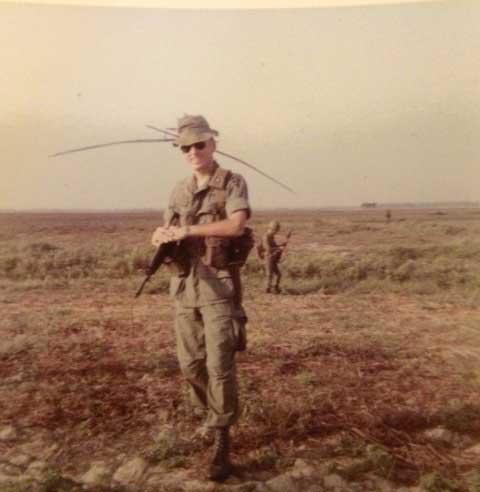
During the Vietnam War, Gregory served in Chau Doc Province, and he received a Vietnam Air Combat Medal, a Bronze Star, and a Vietnam Service Ribbon for his actions. After he was discharged, he worked in politics and finance in Washington, D.C., before he felt a familiar pull toward service, albeit of a different kind.
He joined Court Appointed Special Advocates (CASA), a national organization that works with state court systems to offer counseling and support to children in foster care. He went on to earn a master’s degree in social work and become a licensed master social worker, putting his new skills to use in the Army once again, at Fort Cavazos and Fort Hood, where he helped service members returning from combat deployments and worked on suicide prevention and other programs “that made an impact on the lives of his soldiers,” Butler said.
Before retiring, Gregory returned to CASA, first in California and then in Westchester County, New York. He now lives in Utah, and he continues to work with veterans—including at Fordham, where his influence helped lead to the creation of an art history and appreciation course for veterans. The course is open to students in the School of Professional and Continuing Studies and is held at the Lincoln Center campus.
His support isn’t limited to veterans, though. In 1991, Gregory and other members of the Class of 1966 established an endowed scholarship to honor George McMahon, S.J., a former dean of Fordham College at Rose Hill who drove home the value of service, calling it “the rent we pay for our time on Earth.”
“We have to believe in the totality of ourselves, and that’s, I think, what my Fordham education gave me,” Gregory said. “We are part of the universe; we are part of a lot of different things. Military service is an important part of that. My memories of Vietnam are a part of that mix, but there’s also another part: There’s the humanity of life, the opening of understanding, the ability to listen.”
In addition to Gregory, Stephanie Ramos-Tomeoni, a 2005 alumna of Fordham’s Army ROTC program who is now a correspondent for ABC News and a major in the U.S. Army Reserves, was inducted into the Hall of Fame.
The military ball was held to help underwrite academic, social, and career transition programming for student veterans, ROTC cadets and midshipmen, and other military-connected students at Fordham.
]]>Tradition holds that Fordham’s military heritage dates from 1848, when the state of New York issued Fordham 12 muskets for defense against the threat of nativist rioters, noted Lt. Col. Paul Tanghe, Ph.D., professor of military science at Fordham, at the Nov. 6 event at the Rose Hill campus. Today, the University is home to a military service community comprising “one of the most diverse [ROTC] cadet battalions in the Northeast” and more than 400 students who are veterans, he said, noting the University’s reputation for being welcoming to them.
“The military-connected community is one of the things that makes Fordham special,” he said. “This is a community that’s built around individual paths of service coming together in one place.”
Efforts to honor, support, and grow that community will be part of the yearlong anniversary celebration.
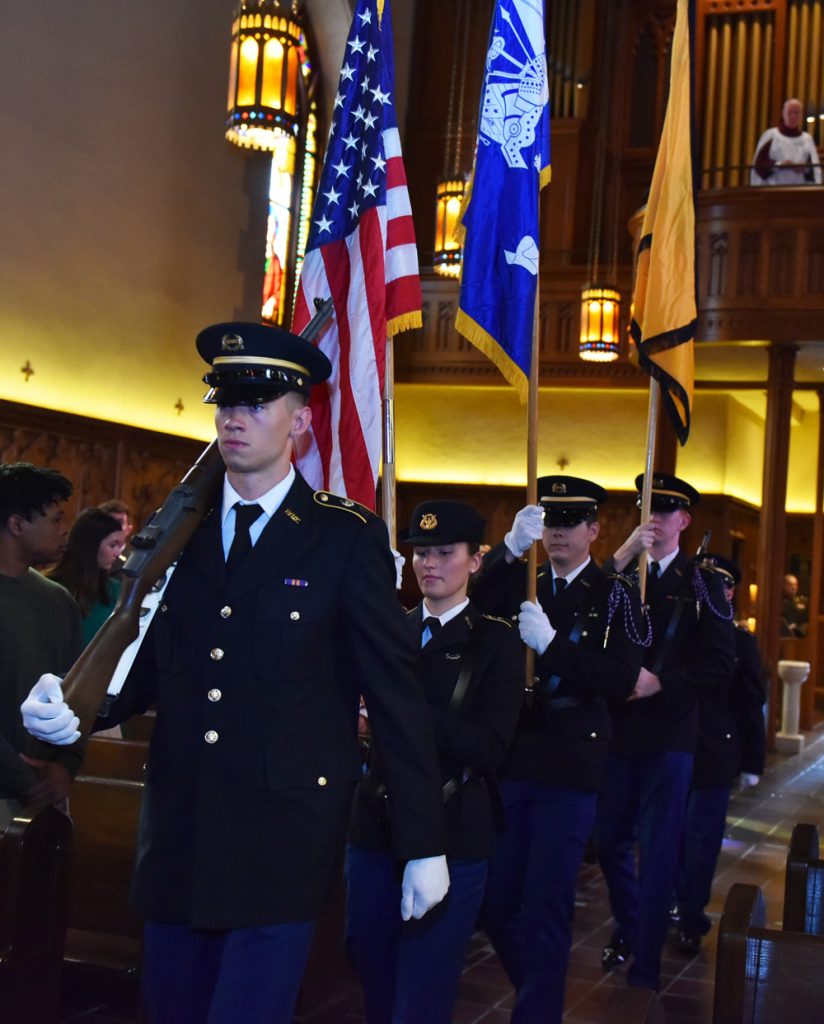
The Office of Military and Veterans’ Services and the Department of Military Science will host two events per month from January through November, with each month’s events organized around a chapter of military history at Fordham. January’s events include a service project—in partnership with Campus Ministry—related to welcoming immigrants, harking back to the origins of Fordham’s military training in 1848. Events in later months will commemorate the Civil War, Vietnam War, World War I, and other epochs, culminating in a gala to be held in November 2023.
There is also a “military muster” outreach effort to Fordham’s military community—ROTC graduates, student and alumni veterans, faculty and staff who served, and friends and family of Fordham veterans—to reengage them with the University. In addition, the veterans’ services office will lead an effort to raise $4.2 million to support ROTC cadets and student veterans as part of Cura Personalis | For Every Fordham Student, the University’s $350 million fundraising campaign.
The veterans’ services campaign received some impromptu support at the Nov. 6 event, which celebrated two distinguished alumni veterans as well as the ROTC program and student-veteran community at Fordham.
Two Who Served with Valor
Attendees included alumni, student veterans, and cadets in Fordham’s ROTC program, a flagship program in the Northeast comprising cadets who attend 17 New York-area schools, from New York University to the Parsons School of Design, Tanghe said.
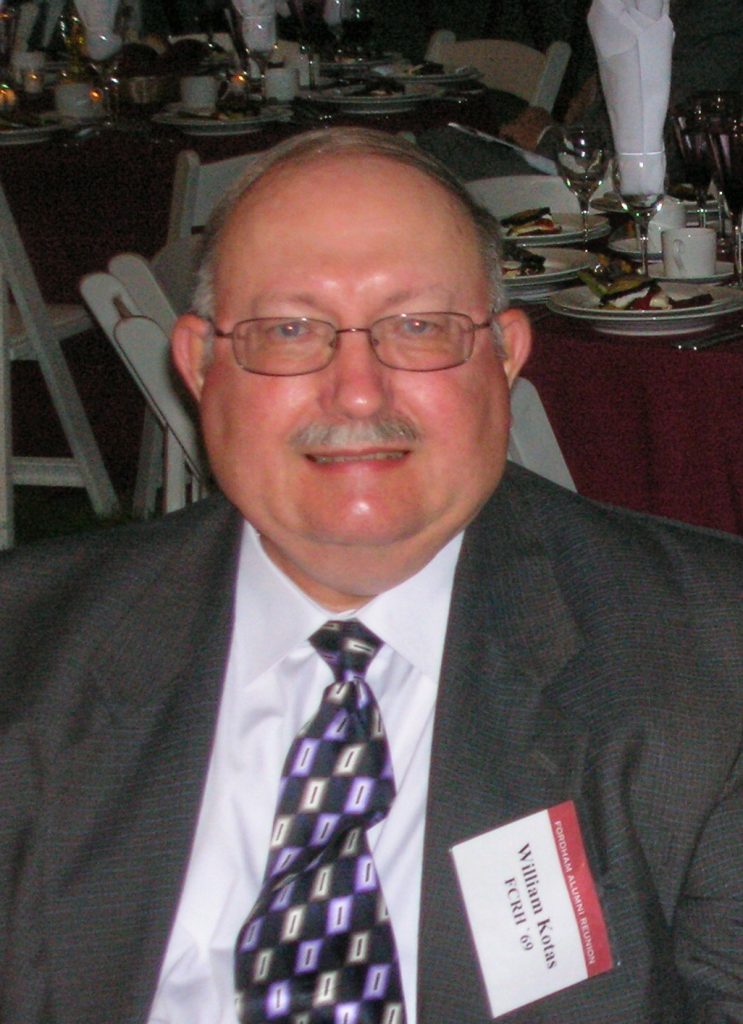
Two alumni veterans were inducted into the Fordham University Military Hall of Fame: William E. Kotas, FCRH ’69, a graduate of Fordham’s ROTC program, onetime U.S. Army captain, and Vietnam War veteran, who was honored posthumously; and retired U.S. Marine Corps Capt. Gerry Byrne, FCRH ’66, a Vietnam War veteran, media executive, community leader, and entrepreneur.
Kotas, who died last year, served as a platoon leader with the 23rd Infantry Division. He was inducted in honor of “the way that he approached all of his duties and obligations to others in his life,” from his cadet years to his post-Army life, Tanghe said.
“His military service was shorter than he wanted it to be because of the manner in which he approached it”—that is, with devotion to the soldiers under his command, Tanghe said.
In a display of that devotion, he personally led a patrol during which he suffered grievous injuries that would require a year of hospitalization and medical retirement from the Army. At the time of his injury, he continued to lead his men and directed them to safety. Kotas received multiple military honors, including the National Defense Service Medal, the Parachute Badge, and the Bronze Star Medal with the “V” device to denote heroism.
Moving back to Nashville, Tennessee, “he continued to find a life of purpose and meaning,” Tanghe said. Kotas was a founding member of the St. Ignatius of Antioch Catholic Church in Nashville and taught in its adult education program on Sundays, among other community activities, and worked for the U.S. Postal Service until his retirement.
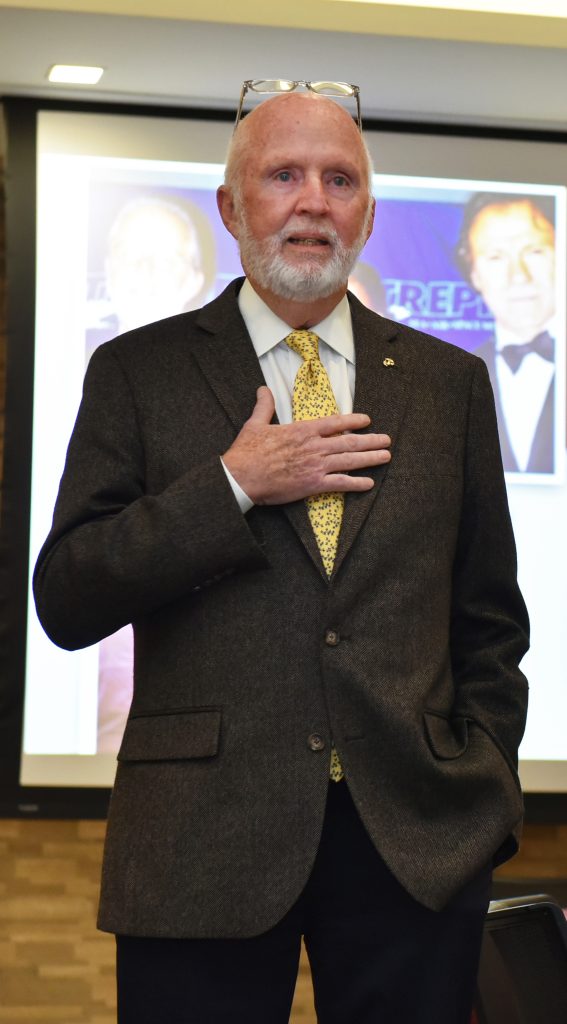
Byrne, a 1962 graduate of Fordham Preparatory School, was commissioned via the Marine Corps’ Platoon Leaders Class, which he attended while earning his degree from Fordham College at Rose Hill. He served on active duty from 1966 to 1969, including a tour in Vietnam spanning the latter two years.
“What I learned at Fordham Prep and Fordham College from the Jesuits was ethics and integrity,” he told the gathering. “In the Marine Corps, I learned discipline and leadership. When you combine it, it’s amazing what you get out of it.”
Byrne has had a distinguished career in media, serving as launch publisher of Crain’s New York Business, creator and chairman of NBC’s Quill Awards, and publisher of Variety, leading its transformation into a diversified global media brand. Today he is vice chairman of Penske Media.
He has hosted a Marine Corps birthday celebration in New York City for the past 25 years, and in 2009, he received the Made in New York Award from then-mayor Michael Bloomberg.
Byrne serves on the boards of nonprofits too numerous to name, including the Intrepid Sea, Air & Space Museum. He learned the value of staying busy, he said, from the famed television producer Norman Lear, who, during a conversation about packed schedules, told him that “life is not a rehearsal.”
“When I go back and think about friends and fellow marines who don’t have the ability to stand here like I am, it’s very moving,” said Byrne, who attended the event with some friends from the Corps and his wife, Liz Daly Byrne.
He said he was “extraordinarily honored” to be inducted into the Hall of Fame “and to be a Fordham graduate, and to see … everyone who’s here today.”
A Fundraising Campaign Begins
The fundraising campaign announced at the event has three components:
- An Emergency Relief Fund to promote wellness for military-connected students and provide loans to help students through financial distress ($100,000 goal)
- An endowment to enrich ROTC cadets’ and student veterans’ education by sending them to events and conferences, bringing guest speakers to campus, and providing gear needed for new training opportunities ($1.75 million goal)
- A drive to create a facility at Rose Hill for student veterans and cadets that promotes inclusion, community, collaboration, and information sharing, in part through new digital resources ($2.3 million goal)
Tanghe noted that the Emergency Relief Fund will provide microloans to help students who, for instance, might be unable to meet monthly living expenses on time, because their veterans’ benefit payments are held up by bureaucratic snafus. “If you’re missing a month of rent in New York City, that can be a significant financial burden,” Tanghe said at the Nov. 6 event.
Matthew Butler, PCS ’17, Fordham’s director of military and veterans’ services, said the fundraising effort has gotten off to a strong start, with one donor contributing $25,000 in mid-October.
During a follow-up meeting, the donor wrote another check, for $70,000, Butler said.
That’s when Byrne spoke up—“Liz and I will throw in the other five” needed to bring the tally up to an even $100,000, he said.
Asked later about his spontaneous decision to donate, he gave a simple reason.
“It’s supporting Fordham and veterans,” he said. “There’s no better reason than that.”
Register here to be connected with others in Fordham’s military-affiliated community.
To inquire about supporting the Office of Military and Veterans’ Services fundraising campaign, please contact Michael Boyd, senior associate vice president for development and university relations, at 212-636-6525 or [email protected]. Learn more about Cura Personalis | For Every Fordham Student, a campaign to reinvest in every aspect of the Fordham student experience.
]]>“Every day you sit through a military science class, every day that you sit through with leaders, who are pouring into you, I suggest you take a few minutes and think about what’s happening. Understand that we’re all tied to something that is huge, and purposeful and you’re tied to a history that dates back to 1775,” he said.
Sullivan, who was invited by Fordham’s Department of Military Science, spent a portion of time talking about the basic functions of the Judge Advocate General’s Corps (JAG), before opening the floor for questions from undergraduates. The division, which is made up of 10,000 civilians and military personnel, is similar to one in the U.S. Navy that captured America’s imagination in the 1992 film A Few Good Men.
Sullivan was commissioned as a Second Lieutenant in the Army in 1993 earned a J.D. from The University of Kansas, School of Law in 1996. He said takes inspiration from
Charles Hamilton Houston, who was the first special counsel for the NAACP. Lawyers, Houston once said, are “either social engineers or parasites on society.”
“I think it’s really applicable to every one of us who wears the uniform; not just lawyers,” he said. “You’re either here to build a country that’s a better place and defend people who are unable in some instances to defend themselves, or you’re in the way.”
Because the Army is so large, he said, those who work for JAG can do everything from working on behalf of the institution itself to supporting individual soldiers in areas such as divorces, consumer protection, and landlord-tenant disputes. There are opportunities to be deployed around the world with different units, and even though all new members spend their first years doing legal assistance and administrative law, it’s customary to branch out into other areas that are applicable in civilian life as well.
“The Army is really committed to making sure you have leaders who are looking out for you. You don’t even get to command a battalion anymore without this really rigorous check on who you are, your background, and the kind of character that you bring to the table,” he said.
Joining the Judge Advocate program is exceedingly difficult, as the Army JAG Corps accepts about 150 to 175 new lawyers out of out 1,500 applicants. Sullivan said that ensures that no one is applying just for a change of career. His advice for standing out? Be amazing at whatever your current job in the Army is.
“What we want are those folks who are the tip of the spear who lean forward,” he said.
“If you’re good at being an infantryman, if you’re good at being a cyber warrior, if you’re good at being a logistician, goodness is always going to eke out. That’s who we want on our team.”
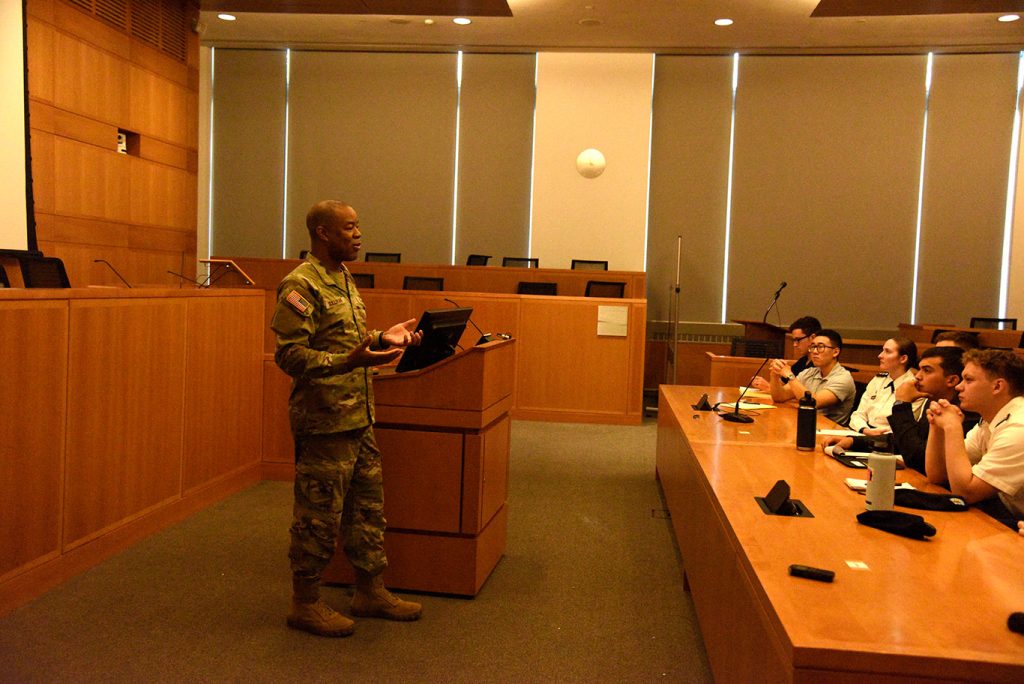
At a Fordham panel, a retired Central Intelligence Agency officer, a U.S. Army Special Forces officer, and an award-winning journalist shared behind-the-scenes stories from the CIA’s first post-9/11 mission to locate Al Qaeda and prevent another terrorist attack in the U.S. The panel, hosted by Fordham’s military science department at the Lincoln Center campus on Nov. 4, is part of the University and its ROTC program’s 20th anniversary commemoration of 9/11 and its legacy.
“The team is modest about this, but it’s hard to overstate the dangers they faced,” said Toby Harnden, a panelist who wrote a book on the mission. “They were a tiny group of Americans working deep in enemy territory in a very ambiguous situation.”
Each of the panelists has a special connection to the mission. Justin Sapp, now military chief of staff to the U.S. ambassador to the United Nations, was a Green Beret captain who was assigned to the team. David Tyson, a Central Asian sociologist who became a Central Asian expert for the CIA, was the team’s linguist. Harnden, a former foreign correspondent who has reported from 33 countries, wrote First Casualty: The Untold Story of the CIA Mission to Avenge 9/11 (Little, Brown and Company, 2021), which chronicles their infiltration into Taliban-controlled territory.
Sapp and Tyson were among eight members of Team Alpha. In some contexts, they resembled a group of dads going on a fishing trip, said Harnden, showing the audience a 2001 photo of the team standing together. But their cross-section of abilities and backgrounds made them invaluable, he said.
The team prepared for their mission with a light packing list, including night vision equipment, Soviet chest racks, and first aid pouches, said Sapp. As they approached the Afghanistan border on two U.S. Special Operations helicopters, said Sapp, he could see the lights in Uzbekistan and the moon reflecting off the Amu-Darya River. But the world beyond was nearly pitch black.
“It was dark, except for little fires here and there. That was something stark that I’ll never forget,” Sapp said.
After they landed in Afghanistan, there were moments of levity. The team met their new partners: ethnic Uzbek calvarymen who were fighting the Taliban and Al Qaeda. Tyson said that when they shook hands for the first time, the Uzbeks marveled at his “soft hands,” a stark difference from their calloused palms.
The Americans joined the Uzbek men on horseback. Their journey included 10-hour rides across mountains, with only one or two breaks, said Tyson. This was a challenge for Tyson, who had only ridden ponies at a fair. He and his teammates often fell off their horses, while the Uzbek soldiers smiled, he said.
“Here we are coming to save the world, so to speak, and we can’t even ride a horse,” Tyson said.
But for the most part, said Tyson, the atmosphere was serious and stoic—and sometimes deadly.
In Nov. 2001, Team Alpha lost fellow CIA officer Mike Spann, the first American casualty in Afghanistan. Tyson and Spann had been gathering intel from a group of Al Qaeda prisoners—one of America’s first opportunities to extract information from men trained by Osama bin Laden, the mastermind behind 9/11—until gunfire erupted. A few prisoners had hid weapons and started an uprising. Spann was killed; Tyson managed to escape.
“I was on autopilot mode. I went to a place I’ve never been to before and never been to since, mentally,” said Tyson, who received the Distinguished Intelligence Cross—the CIA’s highest award for valor—for his work on the mission. “There was no courage or bravery.”
Spann is a hero, said Tyson, as are their partners in Afghanistan. Their team bonded with many people, including a commander named Abdul Rashid Dostum, and others who were killed.
At the end of the panel, the three men reflected on how their time in Afghanistan had reshaped their view on what it means to serve their country. Sapp said that he learned to stay vigilant and learn as much as he can about the world. “As military officers, you never know where foreign policy will take you,” he said. Tyson said that good people across the world are caught in bad systems, politically and economically, that destroy them as individuals. But most Americans don’t know what that’s like.
“I wish we Americans could transport ourselves, mentally, and see what the rest of the world experiences,” Tyson said. “At home, we’re fighting each other for all kinds of odd reasons. But we have something worth preserving and protecting in this country.”
]]>